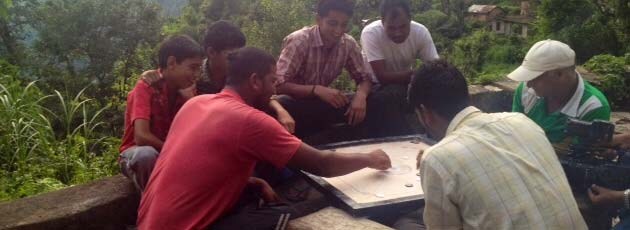
Ukhimath, Uttarakhand:
A group of men playing carrom: not a sight one would expect in a region recovering from a devastating tragedy.
"This is only a distraction to forget what we have been through," said Laxmi Prasad who lost his shop in Rambada near Kedarnath and walked home five days later.
Many, like him, in the Ukhimath region are survivors; others have lost their loved ones in the Kedarnath disaster. What they have in common is a shared loss of livelihood.
It's peak pilgrimage season in Kedarnath, yet everyone from the priests, hotel owners, tea stall vendors to the pony-owners are all penniless, dependent on relief ration and worried about their future.
Some like Yashwant Singh Choudhary, who escaped from Gaurikund, have enrolled in the government's rural employment guarantee scheme. "With this scheme, we will be able to make some money. Right now, there's no money in my pocket and all I'm left with is two sets of clothes," he said.
At Semla village, Urmila Trivedi's son, who worked at the helipad in Kedarnath, has already left the village in search of work. It was a hard decision, she says, but one that was inevitable. "I wanted him to study further, but things didn't work out. He's now gone to Gurgaon, hoping to find some work in a factory there."
Surender Singh Rawat is worried about what the future holds for his village. "I fear there is going to be a lot more migration in the days ahead," he says, "There's nothing to do here anymore. How will people feed their families?"
While many are still to recover emotionally from what they have been through, there's no time to heal. The worry of the future and of their families' lives and livelihoods are a constant cause for concern, a concern that comes with no guarantees.
"This is only a distraction to forget what we have been through," said Laxmi Prasad who lost his shop in Rambada near Kedarnath and walked home five days later.
Many, like him, in the Ukhimath region are survivors; others have lost their loved ones in the Kedarnath disaster. What they have in common is a shared loss of livelihood.
It's peak pilgrimage season in Kedarnath, yet everyone from the priests, hotel owners, tea stall vendors to the pony-owners are all penniless, dependent on relief ration and worried about their future.
Some like Yashwant Singh Choudhary, who escaped from Gaurikund, have enrolled in the government's rural employment guarantee scheme. "With this scheme, we will be able to make some money. Right now, there's no money in my pocket and all I'm left with is two sets of clothes," he said.
At Semla village, Urmila Trivedi's son, who worked at the helipad in Kedarnath, has already left the village in search of work. It was a hard decision, she says, but one that was inevitable. "I wanted him to study further, but things didn't work out. He's now gone to Gurgaon, hoping to find some work in a factory there."
Surender Singh Rawat is worried about what the future holds for his village. "I fear there is going to be a lot more migration in the days ahead," he says, "There's nothing to do here anymore. How will people feed their families?"
While many are still to recover emotionally from what they have been through, there's no time to heal. The worry of the future and of their families' lives and livelihoods are a constant cause for concern, a concern that comes with no guarantees.
Track Latest News Live on NDTV.com and get news updates from India and around the world

